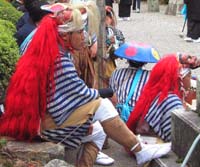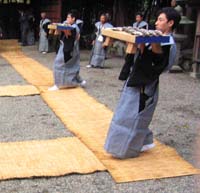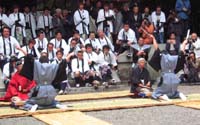FUNAZUSHIKIRI
 Yesterday afternoon on the last day of Golden week we headed across the Lake to Moriyama, on a quest to locate another renowned local festival that I vaguely understood to be of great antiquity, involving sushi of some length. You know how it is when you're on the move between traditions. I misunderstood only slightly.
Yesterday afternoon on the last day of Golden week we headed across the Lake to Moriyama, on a quest to locate another renowned local festival that I vaguely understood to be of great antiquity, involving sushi of some length. You know how it is when you're on the move between traditions. I misunderstood only slightly.
Having started early so we wouldn't be too late, our mapless path only partly resembled chaos as depicted by a two-year-old left alone for an hour in a large white room with a big black crayon. We knew we were at last in the vicinity when we saw a number of young Japanese men clustered by the roadside, some with waist-length bright red hair, others in colorful knee-length skirts. More like sarongs, actually, fashioned of kimono-type fabric, but the sight was nonetheless startling. For a shy populace, the Japanese have a quite number of double-take traditions.
Yes, the young men assured us, this was Shimoniikawa Shrine and this was the Sushikiri Matsuri (Sushi-Cutting Festival). The Sushikiri involves one of Japan's oldest surviving dishes, practically a world cultural asset: funazushi, a foot-long, carefully and lengthily pickled fish
 that nowadays in its highest gourmet form can cost up to 600 dollars per fish. Thought by many to be the original sushi, funazushi is the result of fermenting the female Nigoro Buna (crucian carp) for 4 years in salt, rice and select bacteria till it takes on the qualities of blue cheese. Renowned for its pungency, these days funazushi is only found around Lake Biwa, where the traditions are still as strong as the pickles.
that nowadays in its highest gourmet form can cost up to 600 dollars per fish. Thought by many to be the original sushi, funazushi is the result of fermenting the female Nigoro Buna (crucian carp) for 4 years in salt, rice and select bacteria till it takes on the qualities of blue cheese. Renowned for its pungency, these days funazushi is only found around Lake Biwa, where the traditions are still as strong as the pickles.
 In the Sushikiri ceremony in front of the shrine steps, two select young men, with slow, elaborate ritual, each slice up 10 funazushi, remaining unruffled as their elders shout humorous advice at them from their seats on the steps. The result of all this sacred slicing is then fed to the gods, and the village is set for another year of prosperity. And the ritual certainly seems to work; they've been doing it for over a thousand years.
In the Sushikiri ceremony in front of the shrine steps, two select young men, with slow, elaborate ritual, each slice up 10 funazushi, remaining unruffled as their elders shout humorous advice at them from their seats on the steps. The result of all this sacred slicing is then fed to the gods, and the village is set for another year of prosperity. And the ritual certainly seems to work; they've been doing it for over a thousand years.


















No comments:
Post a Comment